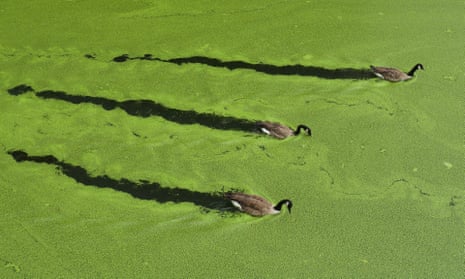Raw sewage is flowing into rivers at thousands of sites across England and Wales, a report has warned, harming wildlife and putting human health at risk.
The total amount of raw sewage intentionally being put into rivers is unknown, which is a “huge concern”, according to conservation group WWF, which produced the analysis. The available data suggests that more than half of overflow sites spill sewage into rivers at least once a month and 14% at least once a week.
WWF argued this is far more frequently than allowed under regulations that permit overflows only at times of unusually heavy rainfall, when treatment works cannot cope.
The report also said the number of reported sewage pollution incidents, including failures at sewage treatment plants, rose in 2016 for the first time since 2012. Furthermore, only 14% of rivers in England have “good” ecological status, which reflects both sewage and farm pollution and low water levels, compared with 27% in 2010.
Sewage pollution can cause algal blooms that starve rivers of oxygen and kill fish, as well as affecting the wildlife such as kingfishers and otters that depend on them. The pathogens in untreated sewage can also threaten people’s health, causing gastroenteritis and even septicaemia and hepatitis A.
“Britain’s bountiful rivers have forever provided the lifeblood of our nation – vital to our economy as well as our wildlife and our own wellbeing,” said Tanya Steele, the WWF chief executive. “The current situation is unacceptable. These findings demonstrate the urgent need to transform the way we treat our freshwater environment.” The government must force water companies to act, WWF says.
The analysis reports that 40% of the rivers in England and Wales are polluted with sewage, which comes from almost 18,000 sewage overflow sites operated by water companies and from treatment plant breakdowns. Thames Water had the highest proportion of rivers affected by sewage – 72% – followed by Southern and Anglian Water.
Until recently, there was little monitoring of how often and for how long the overflows spill sewage into rivers. But data from south-west Wales showed overflows there spilled for an average of 217 hours over a year, with 9% spilling for at least 730 hours a year, equivalent to flowing constantly for a whole month.
WWF warns that without action the situation is likely to get worse due to rising population, increasing urbanisation and climate change making intense rain more common. “It seems companies are relying on sewer overflows to compensate for under-capacity” at treatment plants, the report states. “Our research has revealed a sewerage system on the edge; one that is ill-equipped to protect people and nature as we face the tough challenges ahead.”
An Environment Agency spokeswoman said: “There have been dramatic improvements to water quality over the last two decades but there is more to do. We have set more stringent targets for the water sector, stated they must do more to reduce pollution incidents and in the most serious cases taken enforcement action leading to record fines.”
Since 2015, 4,000 of the sewage overflow sites have been fitted with monitoring equipment to record the frequency and duration of spills and by March 2020 about 11,500 will be monitored, the EA spokeswoman said.
A spokesman for the Department for Environment, Food and Rural Affairs said: “Our rivers are the cleanest they have been since industrial times and we’re working with the water industry to meet tougher targets and improve their planning and investment in wastewater infrastructure.”
A spokesman for Water UK, which represents water companies, said that in relation to pollution incidents WWF had failed to distinguish between the most serious, which increased from four to nine in 2016, and the vast majority which the EA classes as having “only a limited or localised effect on water quality”.
“There’s a genuine debate to be had about how we as a country are going to deal with sewage and drainage issues in future in a way which protects our environment, but WWF have muddied the waters with an inaccurate picture of what is going on,” he said. Wildlife such as salmon and otters have returned to some rivers, he added.
Coastal waters have seen a big reduction in sewage pollution in recent decades but action on rivers has lagged behind, WWF argues. “We know the water industry can clean up their act, if given the right push. They just have to get on and do it,” said Catherine Moncrieff, the freshwater policy manager at WWF.

Comments (…)
Sign in or create your Guardian account to join the discussion